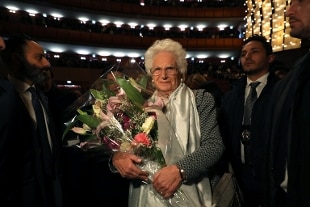- Segre: I am a simple citizen, the Nobel to whom it deserves it
- The march of the mayors in Milan "united against hatred". Segre: your decisive commitment to memory
- Segre, Biella thinks again: honorary citizenship to the senator for life
Share
January 20, 2020 "My body has been a prisoner, but my mind has always flown. That they could not have held her prisoner: I always thought with my head". So the senator for life, Liliana Segre, told the deportation to the concentration camps to an audience of Milanese students in the Teatro degli Arcimboldi in Milan.Hundreds of students warmly welcomed life senator Liliana Segre. She survived the Auschwitz Nazi extermination camp and spoke to the students ahead of the Memorial Day scheduled for January 27. The minister of education Lucia Azzolina took part in the meeting, in one of the first public releases in the new role.
He addressed an appeal to young people: "It is the freedom of thought that you have to defend", against that indifference that instead reigned in Europe during the Shoah: "There was not even a railway worker to wonder why those trains left full and came back empty "Even the Allies - said the senator for life - did not bomb the railways, the factories and least of all the concentration camps. Nobody cared about us and nobody agrees to know the truth of those fields. Not even when someone managed to escape and speak to the English Prime Minister Churchill to tell what was happening in Europe. "
After the war "I saw those people I had so much feared throwing away the uniforms with which they had frightened us. Indeed with which they had frightened the armies of all Europe. Without the Russians and the Americans they would have won everything," Segre pointed out. Stressing that "it was the partisans who helped to find freedom".
Liliana Segre then came to talk about the moment when the doors of the concentration camp where she was a prisoner, Ravensbruck, "opened". "Today it is obvious for us to go wherever we want but that day the order came out of the field. And we, very weak, could not even bear the joy". Despite this "I realized it was an exceptional moment: the story was changing". At that moment I saw my jailer, the head of that last camp put on his underwear and go home, a loving father who must have been. I had fed on hatred and revenge. But I didn't pick up that gun and became that free and peaceful woman I am even now. "

